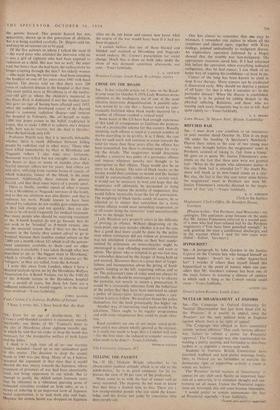CRIME ON THE ROADS Sig,--In her valuable article on 'Crime
on the Roads' in your issue for October 9, 1959. Lady Wootton draws attention to the inadequate use of one of, the most effective deterrents, disqualification. A possible solu- tion would be to rule that a licence would be auto- matically forfeited When black marks incurred for a number of offences reached a critical total.
Some states in the US have had enough experience of this kind of arrangement to facilitate the prepara- tion of a practicable scheme for this country. Broadly speaking, each offence is rated at a•certain number of marks according to its gravity. It is, I think, the case that no such mark will continue to count towards the total for more than three years after the offence has been committed, but there' is obvious scope for vary- ing the details. The magistrates Would determine whether a motorist was guilty of a particular offence and impose whatever penalty was thought to be appropriate to that offence. .There would also be an entry on the licence. The total of black marks on the licence would then continue to mount and the licence would be automatically withdrawn at a certain total. It would not be necessary to wait and hope that the magistrates will ultimately be persuaded to bring themselves to impose the penalty of suspension; that would follow inexorably from the list of convictions. The weighting of black marks could, of course, be so adjusted as to ensure that conviction for a more serious offence would incur immediate suspension, or at all events bring the motorists' total uncomfortably close to the danger level.
Lady Wootton very properly refers to the difficulty of proving an offence. Without disagreeing OIT the main point, one may wonder whether it is not the case that a good deal more could be done by the police even where conviction did not follow or prosecution was not attempted. Constables on their beat supple- mented by policemen on motor-bicycles might be encouraged to stop offending motorists and warn or advise. The driver who is tempted to go too fast may be somewhat deterred by the danger of being held up and warned. Moreover there is a great deal of forget- fulness and incompetence about the giving of hand- signals, keeping to the left, respecting zebras, and so on. The policeman's tone of voice need not always be unfriendly. He should be encouraged to try to educate the motorist, not merely to secure a prosecution. It would be a reasonable inference from the behdviour of the police that' they have been instructed to adopt a policy of laissez-faire, laissez-passer unless a con- viction is sure to follow. We need not blame the police themselves, for the fault presumably lies higher up.
Another way of instructing road users would be by television. There ought to be regular programmes and with some imagination they could be made effec- tive.
Road accidents are one of our major social prob- lems and it was almost wholly ignored at the election. Is it really too much to hope that a Cabinet will now —for the first time—be induced to consider seriously what needs to be done?--Yours faithfully,










































 Previous page
Previous page